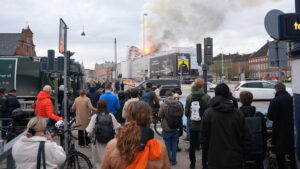Who were World Central Kitchen aid workers killed in Gaza strike?

[ad_1]
He sent them to her, and she responded with a heart. Hours later, she was dead.
Frankcom, 43, was among seven WCK workers who the nonprofit said were killed in an Israeli strike in Gaza on Monday. It has pushed WCK and at least one other group to pause aid operations as famine looms over besieged Gaza and pressure mounts on Israel over the rising Palestinian civilian death toll.
The attack on the organization founded by celebrity chef José Andrés drew international rebuke and calls for a thorough investigation by Israel. Along with Frankcom, an Australian citizen, the strike killed one Palestinian, a U.S.-Canadian dual national, three British citizens and one Polish citizen, according to WCK. The toll was confirmed by the national governments of the victims.
WCK said the team was traveling in the Palestinian enclave in vehicles that included two armored cars branded with the World Central Kitchen logo. The aid group said it had coordinated its movement with the Israeli military.
Israeli Prime Minister Benjamin Netanyahu said Israeli forces “unintentionally hit innocent people” and that Israel would fully investigate the “tragic incident.”
Phelps, who left WCK in 2021, remembered Frankcom as a person who could make lifelong friends in the direst situations. “You knew when Zomi was in the room,” he said. “She loved to laugh, loved to have a good time.”
The two met in 2018 after a volcano eruption in Guatemala, as Frankcom was traveling in Central America and taking classes online after leaving a job at an Australian bank. She began helping to provide food aid with WCK. Her work took her around the world, including Paradise, Calif.; Egypt; and Turkey. “She just bonded with every community she worked in,” Phelps said.
The last mission they did together was in Haiti in 2021. “She was riding around delivering food on the back of motorcycles,” Phelps recalled. “Her sense of responsibility to the people we serve and to go the extra mile was really special — and also to keep a great attitude.”
That attitude took her to Gaza. When Phelps messaged on WhatsApp to ask how she was feeling, she wrote back: “I’m getting used to the drones but the booms still make my tummy go funny.”
Her death shook people she had met around the world, Phelps said. “She had a zest for life, a heart for service,” he added. “People will remember her.”
Australian officials condemned the strike and said they had contacted Israeli authorities and called for an investigation. “We expect full accountability for these deaths,” the Australian Foreign Ministry said.
The director of al-Najjar Hospital in Gaza, Marwan al-Hams, said the facility received the bodies of the seven workers — six with “Western nationalities” and one Palestinian, whom he identified as Seif Issam Abu Taha.
Yousef Sharef said Abu Taha, 26, was a cousin working with the WCK team in Gaza whose death was a “big loss” to the family and a shock. “He was a friendly, lovely person, and he used to always do good things and to support people who need help,” Sharef said.
Britain summoned the Israeli ambassador due to the incident, the Foreign Office said in a statement. Separately, Foreign Secretary David Cameron told Israeli Foreign Minister Israel Katz that the deaths of “aid workers in Gaza, including three British nationals, are completely unacceptable.” Cameron said Israel must explain how the attack happened and “make major changes to ensure safety of aid workers on the ground.”
A U.S. official, speaking on the condition of anonymity, confirmed that a U.S.-Canadian national was among those killed. Canadian Foreign Minister Mélanie Joly said she was “horrified” to hear of the strike, which she confirmed had killed a Canadian citizen. Joly said Canada demanded “full accountability for these killings.” U.S. Ambassador to Israel Jack Lew said he was “deeply saddened by the devastating loss of a U.S. citizen” in the killings.
“We’ve spoken directly to the Israeli government about this particular incident. We’ve urged a swift, a thorough and impartial investigation,” Secretary of State Antony Blinken told reporters in Paris.
Poland’s Foreign Ministry confirmed that a Polish national was killed and extended its “deepest condolences to the family of the volunteer who was providing aid to the Palestinian people in the Gaza Strip.” The ministry said it objected to the “disregard for international humanitarian law.”
The mayor of the Polish city of Przemyśl identified the victim as Damian Soból, a 35-year-old aid volunteer.
“There are no words to describe the feelings of people who knew this amazing young man right now,” wrote Mayor Wojciech Bakun.
Aparna Branz, a former WCK volunteer, said she got to know Soból while volunteering in Poland and Ukraine in 2022. She described him as “always smiling, kind, patient and ready to help anyone anytime.”
“He was one of the bright lights in those horrible months,” Branz said. She also remembered him as a devoted son who often spoke on the phone with his mother.
The two met again working in the aftermath of last year’s earthquake in Morocco. Branz recalled that Soból was busy getting ready to leave for Rafah at the time, but still, “typical to Damian, he helped me navigate the logistics of transportation, of where to go and where to stay.”
During their work together in the early days of the war in Ukraine, “we didn’t talk about our reason for being there,” she said. “We just wanted to help.”
Frances Vinall, Heba Mahfouz and Cate Brown contributed to this report.
[ad_2]






